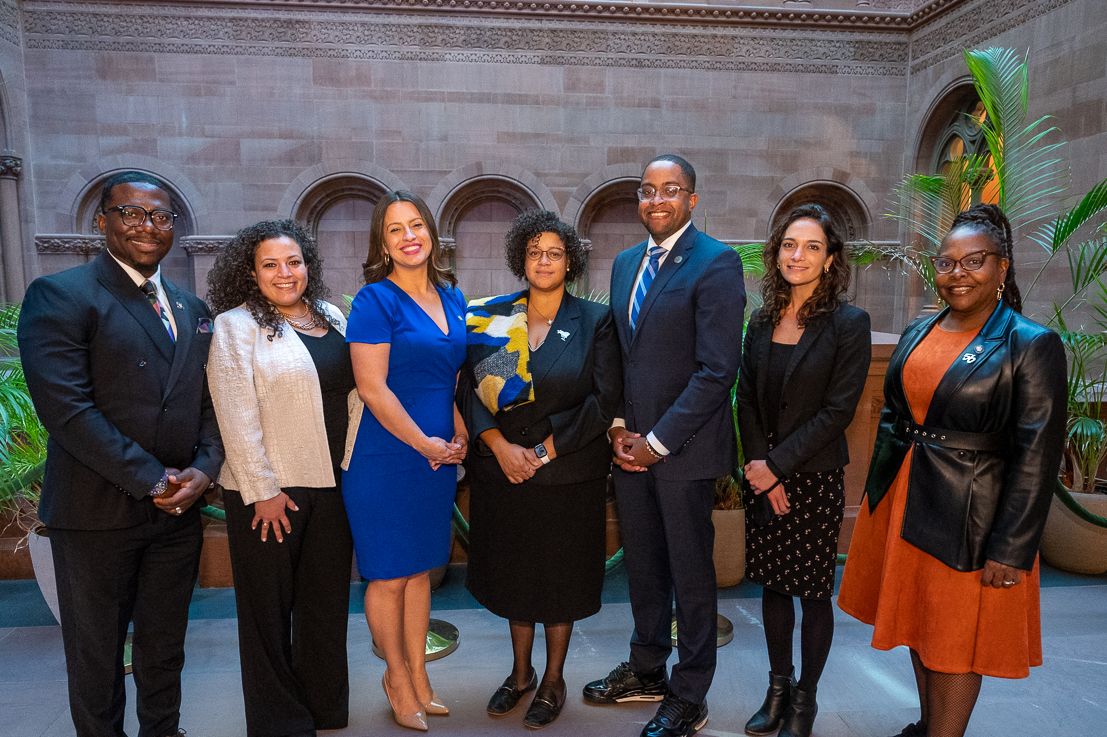Policy
NY Black, Puerto Rican, Hispanic and Asian Caucus unveils budget priorities
The group of more than 70 lawmakers called their agenda “A Demand for Justice.”

Black, Puerto Rican, Hispanic and Asian Legislative Caucus Chair Michaelle Solages Thomas A. Ferrara/Newsday RM via Getty Images
The Black, Puerto Rican, Hispanic and Asian Legislative Caucus is set to release its broad and multifaceted budget and policy agenda for the upcoming legislative session. It touches on a variety of issues from taxes on the wealthy to climate change.
This year’s agenda is entitled “A Demand for Justice,” and contains a number of big-ticket proposals. Those include the New York Health Act, which would create a single-payer health care system in New York, increasing the personal income tax for millionaires, and the creation of a rental voucher program for New Yorkers experiencing homelessness or at imminent risk of eviction. That particular legislation has bipartisan support as well as the backing of the real estate industry, but the governor has expressed concerns over the cost.
“We've seen that throughout the COVID pandemic, and even after, the income disparity, and the squeeze on New Yorkers that is happening,” Caucus Chair Assembly Member Michaelle Solages told City & State. “We see that right now so many individuals are suffering, whether it's systemic racism, or the injustices that are happening in our society. So we have to demand justice, we can't just sit back.”
The nearly 60-page document represents the budget and policy wishlist for the powerful caucus, which boasts over 70 members in the state Senate and the Assembly. Last year, several of the group’s agenda items got approved before the end of the year, including the Clean Slate Act, which the governor has signed into law, and indexing minimum wage to inflation, which was part of the last year’s budget.

According to Solages, the “three H’s” are at the heart of this year’s document. “Whether it’s housing, health care and holding the line on making sure that we’re not cutting any essential programs,” Solages said, adding that providing quality education and continuing to fully fund foundation aid for public schools is also a top priority. In education priorities, the agenda also includes a New Deal for CUNY and SUNY, a $1.7 billion investment into the state’s public universities over the next five years. For health care, Solages also highlighted the caucus’ commitment to improving maternal and infant health outcomes. That issue receives its own subsection in the plan document with six separate proposals.
In terms of revenue, in addition to the increasing taxes on millionaires, the caucus is also planning to fight to reform the estate tax, implement a tax on inherited income, impose a new capital gains tax and create a tax on ammunition, something that Gov. Kathy Hochul proposed in 2022. The caucus also included the creation of a universal basic income program pilot.
The caucus is also throwing its support behind what are expected to be two of the biggest climate change priorities in the upcoming session, the Climate Change Superfund Act and the New York HEAT Act. The former would require the most prolific polluters to pay $3 billion into a fund annually for 25 years that would be used to cover costs related to combating climate change. The latter would eliminate a subsidy for new gas hookups paid for by New Yorkers and cap utility bills for low-income ratepayers.
According to the document, the caucus “adheres to holding the line” on discovery reforms, which were approved in 2019 at the same time as the state’s controversial bail reforms. Last year’s budget negotiations included discussions of rolling back parts of the discovery law, which require prosecutors to turn over evidence more quickly. Hochul and law enforcement successfully pushed for rollbacks to the bail law last year, but in the end, tweaks to discovery did not make it into the final budget. The caucus is also backing parole reforms that criminal justice advocates are fighting for, the Access to Representation Act, which would create the right to an attorney in immigration court, and approving the Treatment Not Jails Act, which seeks to broaden non-penal alternatives for people suffering from drug addiction or mental health issues.

NEXT STORY: NYC Council grills Adams admin budget director on proposed cuts